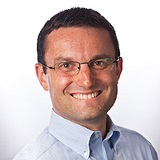 Robert Blum, Intel Corporation
Robert Blum, Intel Corporation
Robert Blum is the Senior Director of Marketing and New Business for Intel’s Silicon Photonics Product Division. Prior to joining Intel, Blum was Director of Strategic Marketing at Oclaro Inc., and held various director of product management and marketing roles for Oclaro’s telecommunications products and consumer laser portfolio. Before joining Oclaro, he was a product line manager for optical transmission components at JDS Uniphase Corporation and held various engineering and marketing management roles at Gemfire Corporation, all in California. Blum worked at Deutsche Telekom’s research labs in Darmstadt, Germany, while completing his master’s thesis and holds a doctorate degree in physics from the University of Technology in Hamburg. He has also studied and done research at Ecole Polytechnique Fédérale in Lausanne, Switzerland, and at Stanford University in California.
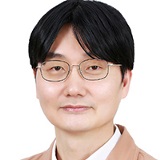 Tae-Woo Lee, Seoul National University
Tae-Woo Lee, Seoul National University
Tae-Woo Lee is a professor in the department of Materials Science and Engineering (MSE) at Seoul National University, Korea. His research focuses on printed or flexible electronics using organic, organic-inorganic hybrid perovkite materials, and carbon materials for applications in displays, solid-state lighting, solar energy conversion devices, and bio-inspired neuromorphic devices. He received his PhD degree in chemical engineering from KAIST in 2002, then joined Bell Laboratories as a postdoctoral researcher and worked at Samsung Advanced Institute of Technology as a member of research staff until 2008. He was an associate professor in MSE at Pohang University of Science and Technology until August 2016. He was elected as an MRS fellow in 2020. He received the 2006 Merk Award, 2008 Korea Young Scientist Award from the President of Korea, 2013 Scientist of the Month Award of Korea, 2018 Research Innovation Award of Korea and 2019 National R&D Achievement Award 'Presidential Citation' of Korea. He is author and co-author of >250 papers in prestigious journals including Science, Nature Photonics, Science Advances, Nature Communications, PNAS, Energy and Environmental Science, Joule and Advanced Materials. He is also the inventor or co-inventor of over 410 patented technologies (>190 Korean patents and >220 international patents) of which 10 patents are licensed. He is the founder of a start-up company and has delivered over 200 invited/keynote/plenary talks worldwide. He currently serves as an international editorial board member for Advanced Materials, EcoMat, FlatChem, and Semiconductor Science and Technology and as an associate editor of Organic Electronics.
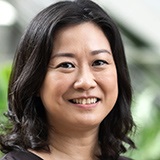 Sierin Lim, Nanyang Technological University
Sierin Lim, Nanyang Technological University
Sierin Lim is an associate professor of bioengineering at the School of Chemical and Biomedical Engineering at Nanyang Technological University (NTU). She is currently serving as the associate dean (Global Partnerships) at the NTU Graduate College and the co-deputy executive director of the NTU Institute for Health Technologies. Her Bioengineered and Applied Nanomaterials Laboratory (BeANs Lab) and Molecular & Cellular Bioengineering Laboratory (MCBe Lab) focus on the design and engineering of hybrid nano/microscale devices from biological parts for applications in health, cosmetics, food and the environment. Lim earned a BS degree in chemical engineering and PhD degree in biomedical engineering from University of California, Los Angeles. She founded the Biomedical Engineering Society (Singapore) student chapter in 2009, Women@NTU in 2018, and Society of Women Engineers Singapore in 2021, of which she is the vice president (academic). In 2013 she received the L'Oréal-UNESCO Singapore for Women in Science National Fellowships, and in 2020, the Inaugural Singapore 100 Women in Tech List. She is a STEM Ambassador for Girls2Pioneers of the United Women Singapore.
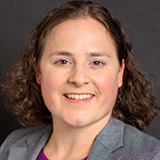 Katharine Page, The University of Tennessee, Knoxville
Katharine Page, The University of Tennessee, Knoxville
Katharine Page is an assistant professor of materials science and engineering at the University of Tennessee Knoxville, holding a joint faculty appointment with the Neutron Scattering Division at Oak Ridge National Laboratory. She works at the intersection of functional energy materials research and the advancement of x-ray and neutron scattering methods. This includes ventures to understand and control local to long-range ordering in ferroelectric ceramics, energy conversion materials, and nanoscale catalysts, among other topics. She received her PhD degree in 2008 from the Materials Department at the University of California, Santa Barbara. Katharine was a director's postdoctoral fellow and an instrument scientist at the Lujan Neutron Scattering Center at Los Alamos National Laboratory through 2014, and then an instrument scientist within the Diffraction Group at Oak Ridge National Laboratory until 2019. She has published more than 130 peer-reviewed journal articles, delivered over 40 invited talks, and organized dozens of workshops, schools and tutorial sessions for the scientific community on advanced scattering techniques. She is a 2015 recipient of the Department of Energy (DOE) Early Career Award and a co-Principal Investigator in the UNCAGE-ME Energy Frontier Research Center. She received an Exceptional Service Award from the Neutron Scattering Society of America in 2018 and she is a 2019 recipient of the Presidential Early Career Award for Scientists and Engineers (PECASE).
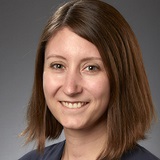 Ashley White, Lawrence Berkeley National Laboratory
Ashley White, Lawrence Berkeley National Laboratory
Ashley White is the head of strategic development and communications for Lawrence Berkeley National Laboratory’s Energy Sciences Area and the Director of Communications for Advanced Light Source, a DOE Office of Science synchrotron light source user facility at Berkeley Lab. In these roles, she draws on her background as a materials researcher and science policy advisor to inform science strategy and convey key accomplishments to current and potential facility users and the science research community, federal funders and policymakers, and the general public. Prior to joining Berkeley Lab, she served as an MRS/OSA Congressional Science & Engineering Fellow working in the office of U.S. Senator Al Franken and in the National Science Foundation’s Division of Materials Research as an AAAS Science and Technology Policy Fellow. She also previously managed the materials research program at the U.S. Green Building Council. She received a PhD degree in materials science from the University of Cambridge, and a BS degree and BA degree in materials science and engineering and music, respectively, from Virginia Tech. She is a past recipient of the MRS Woody White Service Award. In addition to serving as an MRS Meeting Chair, White’s MRS volunteer activities include chairing the Focus on Sustainability subcommittee and the MRS Congressional Fellowship selection committee and serving on the editorial advisory board of MRS Energy & Sustainability.
Welcome to the 2023 MRS Spring Meeting!
The 2023 MRS Spring Meeting will be held at the Moscone West Convention Center and the San Francisco Marriott in San Francisco, CA, April 10 – 14, 2023. We look forward to welcoming you back to the Bay Area for this special occasion marking the 50th anniversary of MRS’s founding. There will be 59 symposia grouped into nine topical clusters, as follows:
Characterization (CH):
This cluster features three symposia that will highlight recent developments in characterization techniques for studying quantum and energy materials. Topics encompass new advancements for the study of electrochemistry, the progress in energy materials design enabled by neutron scattering investigations, and the development of cryogenic techniques for transmission electron microscopy and spectroscopy studies.
Energy and Sustainability (EN):
Focusing on energy and sustainability topics, this cluster includes 11 symposia spanning fundamental science to applications across materials for clean energy production, energy conversion, energy storage, and energy-efficient technologies, as well as greener approaches to materials waste. Topics range from solid state batteries, electrochemical capacitors, and polymeric and organic materials for energy storage to 2D materials for energy conversion, thin-film semiconductor photovoltaics, and critical materials for energy applications. Also included are symposia on caloric materials, concentrated solar thermal technologies, building materials, and new approaches to decomposing materials waste.
This cluster features four symposia dedicated to a range of nanomaterials including graphene, 2D materials, Janus nanomaterials, and nano-sized photocatalysts, as well as their various applications. The symposia include topics related to synthesis, properties, and various device applications covering theory and simulations, rational design and synthesis and advanced characterization of nanomaterials, and their device applications to electrochemical and photocatalytic systems and other novel functional domains.
Soft Materials and Biomaterials (SB):
The nine symposia under soft materials and biomaterials cluster cover engineered living materials, nanomaterials, bioelectronic materials, peptide and protein-based materials, unconventional polymer networks, soft matter interfaces, and biomaterials under extreme conditions. Fundamental science and approaches to characterization will be discussed towards applications that range from biomedicine, disease detection, and therapeutic tools to adaptive materials, thin-film devices, haptic materials, as well as sustainable materials and manufacturing.
Electronics, Optics and Photonics (EL):
This cluster, the largest in this meeting, features 21 symposia covering a variety of topical areas in electronics, optics and photonics. These include symposia focusing on fundamentals and advances in electronic, optical and photonic materials such as organic semiconductors, hybrid perovskites, quantum dots, two-dimensional (2D) materials, phase-change materials, electrochromic materials, colloidal plasmonic particles, and nanostructured semiconducting materials. Also included are symposia on their related applications to memory and neuromorphic computing, optoelectronics, lighting and displays, and flexible/stretchable electronics.
Materials Modeling and Data Science (MD):
The two symposia in cluster will cover machine learning for materials modeling and development, integration of data-driven machine learning with knowledge-driven innovative simulations and modeling for materials discovery, developments of data-driven multiscale methods in computational and experimental studies of materials, studies bridging computation and experiment, and new understandings of material behaviors enabled by data-driven multiscale methods.
Quantum Materials and Systems (QM):
The cluster on quantum materials and systems consists of four symposia highlighting the latest quantum and topological materials and other related materials such as functional topological ferroic materials (ferroelectric, ferromagnetic, and multiferroic). The symposia in this cluster will focus on strategies to manipulate or detect magnetism in 2D- and quasi-2D quantum and topological materials, functional topological electric and magnetic solitons, topological phenomena for unconventional computing, out-of-equilibrium quantum phenomena, and charged topological defects in a broad range of quantum materials such as oxides and chalcogenides.
Structural and Functional Materials (SF):
This cluster features five symposia spanning a broad range of advanced materials topics including high entropy materials, materials for space applications, emerging thermal materials, and responsive architected materials. These topics are complemented by a symposium addressing aggregation and self-assembly for building advanced materials. Themes across the symposia include advances in fundamental theories, novel synthesis and processing strategies, state-of-the-art characterization methods, integration into devices, and behaviors under extreme environments.
Symposium X—MRS/The Kavli Foundation Frontiers of Materials:
This special symposium on Frontiers of Materials Research will feature presentations aimed at a broad audience and on topics at the forefront of research in materials science and engineering.
To complement the symposia, tutorials will provide detailed information on modern and emergent areas of research and the Exhibit will showcase products and services of interest to the scientific community. The Meeting, Exhibits and Posters will be located at the Moscone West Center.
Special programming will be included to celebrate the 50th anniversary of MRS and will look towards the next 50 years of materials science and engineering.
The beautiful city of San Francisco was long home to the MRS Spring Meeting until 2015. We hope you will join us for the return to the Bay Area to commemorate 50 years of interdisciplinary materials research and technology advancement through MRS. Meeting attendees will find San Francisco to be a very accessible and attractive host to foster interaction, insights, and inspiration. A variety of restaurants, sightseeing, sporting events, and historic and cultural sites are just steps away from the Moscone Center and hotels. The region also offers an abundance of pre- and post-meeting touring options.
We look forward to seeing you in San Francisco to share materials insights and discoveries!
Sincerely,
Robert Blum, Tae-Woo Lee, Sierin Lim, Katharine Page and Ashley White
2023 MRS Spring Meeting Chairs